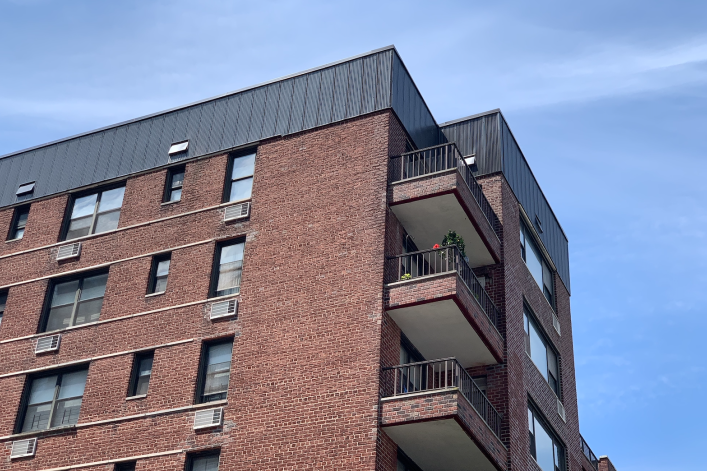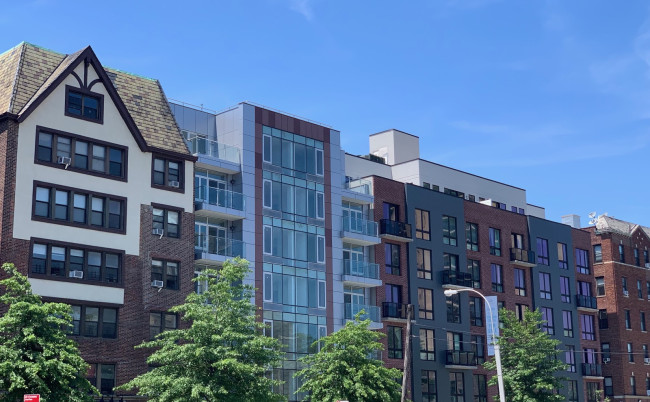My landlord won’t let me go month to month, but offered an opt-out clause if I renew. What’s the catch?

Renewing your lease with an opt-out clause, instead of going month to month, is more beneficial to you, your roommates, and your landlord.
Our lease ends this month and we asked our landlord if we could go month to month because one roommate is unemployed as a result of Covid. The management company said no. Instead, they offered to renew our lease for one year with a clause that says we can move out early, without penalty, if we give 30-days notice. Isn't this pretty much the same as going month to month? Are there any downsides to this?
Leases with opt-out clauses are more popular these days in New York City because of hardships and insecurity related to the Covid-19 pandemic. As a renter, it’s actually better for you and your roommates to sign a one-year lease with an opt-out clause, rather than go month to month, says Sam Himmelstein, a lawyer who represents residential and commercial tenants and tenant associations (and a Brick Underground sponsor).
That’s because you'll have the legal protections of a lease, and it locks in your rent for the full year if you do stay, Himmelstein says. “And you still get to move out early if needed,” he notes.
However, if the city starts to return to normal before you move out, and you are month to month, your landlord might decide to increase your rent, which isn’t ideal if you’re already dealing with Covid-related hardships.
[Editor's Note: Realty Bites tackles your NYC rental questions. Have a query for our experts? Drop us an email. We respect all requests for anonymity.]
There are several variations of opt-out clauses, and depending on the terms in your lease, and the situation for you and your roommate, some might be more beneficial than others—so read the wording of the clause carefully.
Some opt-out clauses require you to live in the apartment for at least 90 days before you can move out. Others allow you to move out anytime during the lease, as long as you give advance notice, which is typically 30 to 60 days, Himmelstein says.
However, some opt-out clauses say you cannot move out during a “blackout period,” usually from November to January 1st. Those months are the hardest to rent apartments. So, if your roommate doesn’t find a job by then, or you or another roommate are laid off during those months, you are legally obligated to stay until the end of the blackout period.
Unless any of the provisions in your opt-out clause violate public law, it’s not illegal for your landlord to include those specific terms.
You should also understand your obligations as a tenant if you do sign a lease with an opt-out clause, says Steven Kirkpatrick, a partner at the law firm Romer Debbas. For example, some landlords will require you to inform them of your early move out by certified mail, or even return receipt. So, simply sending an email to your landlord might not be an option.
From a landlord’s perspective, the benefit of having you sign a one-year lease with an opt-out clause, rather than letting you go month to month, is two-fold, Kirkpatrick says.
If you have a lease, it likely says that you're required to give advance notice before you move out, which gives your landlord time to list the apartment and find a replacement. If you’re month to month, you can basically move out whenever you want, potentially leaving your landlord with a vacant apartment unexpectedly.
In addition, New York City laws require landlords to give month-to-month tenants 30- to 90-day notice if they want you to vacate, depending on how long you’ve lived there. And, they have to serve the notice through a process server, which can be costly, Kirkpatrick says.
But, if you have a lease, they can simply choose not to renew it. Your landlord still has to give you proper written notice, according to Section 226-C of New York's real property law, which is 30 to 90 days depending on how long you've lived there.
Himmelstein says it also gives your landlord a sense of security because a lease outlines what you can and cannot do in an apartment, like not having a pet or smoking in the apartment. If you’re month to month, there’s no legal obligation for you to follow those rules and regulations.
The last thing you and your roommates should consider before signing the lease is if any concessions are being offered. Obviously, if any rent credit or months free are given to you at the end of your lease-term, and you move out before, then you’re giving up those concessions.
But, if you got your first month free, and you move out before the lease is up, you might have to pay at least some of it back, Kirkpatrick says. Most landlords include a clawback provision that says you are responsible for paying it back if you don’t stay for the full-term of the lease.
You can try to negotiate this to only pay back the prorated amount though. “If you move out in month 10, then it wouldn’t make sense for you to pay all of the first month back,” Kirkpatrick says.
So, this lease gives you and your roommates, and your landlord, both security and flexibility.
Read the fine print and consider all of your options, but if staying in your current apartment works for everyone, signing the lease with the opt-out clause mostly works in your favor.
You Might Also Like



























